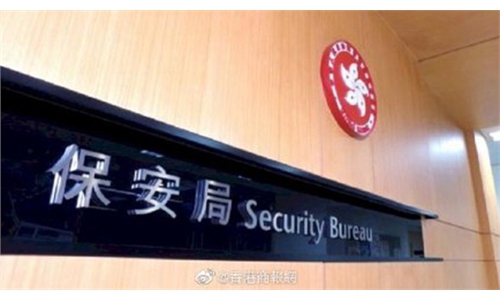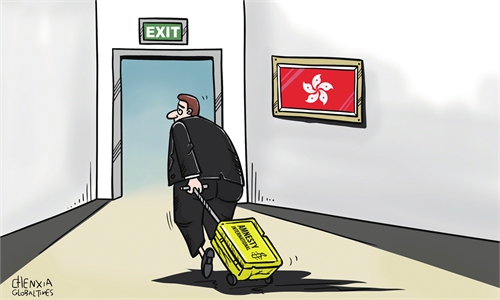GT investigates: Plenty of space in Hong Kong for NGOs, but no longer for subversive groups like Amnesty International
Fresh beginning
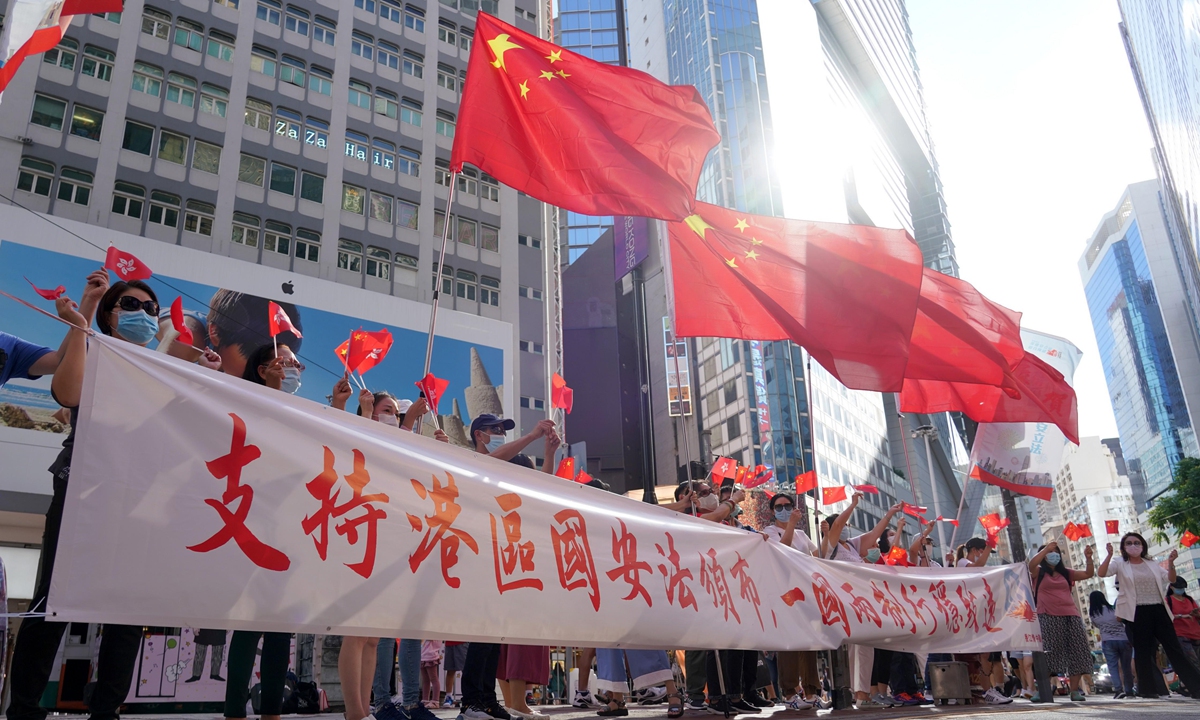
Hong Kong residents converge on the streets of Causeway Bay on June 30, 2020 to celebrate the 23rd anniversary of returning to the motherland and the enactment of the national security law. Photo: VCG
Amnesty International, another non governmental organization (NGO) widely known for its infamous role in meddling in China's internal affairs and instigating a color revolution in its Hong Kong Special Administrative Region (HKSAR), announced it will withdraw from Hong Kong. Chinese legal experts and observers consider that, under the national security law for Hong Kong, there is no room for those foreign organizations to engage in subversion through so-called Western human rights and democratic values.
The international organization said on October 25 that it would close its offices in Hong Kong due to the national security law for HKSAR, according to media reports. Anjhula Mya Singh Bais, chair of Amnesty's international board, said that the decision "has been driven by Hong Kong's National Security Law which has made it effectively impossible for human rights organizations in Hong Kong to work freely and without fear of serious reprisals from the government."
The Hong Kong Security Bureau said in a statement sent to the Global Times that any accusation that the national security law for Hong Kong erodes freedom is completely inconsistent with the facts. In Hong Kong, any organization must comply with the law, including the national security law for Hong Kong, it said.
With the implementation of the national security law for Hong Kong, the safeguard of national security issues has been strengthened. "Amnesty International made its own choice to leave Hong Kong, which means the organization clearly understood its misconduct and it could not do anything it wants anymore," Kingsley Wong Kwok, chairman of the Hong Kong Federation of Trade Unions and a CPPCC member, told the Global Times.
Why did the NGO make the decision to leave the city? What conduct did it have in the past that could violate the law? Why is there no room for those organizations endangering China's national security in the city anymore?
Fleeing with guilty conscience
Founded in 1961, the UK-based Amnesty International has about 7 million members worldwide. It claims to have been founded to promote the cause of global human rights but its dark history of interfering in the internal affairs of other countries under the pretext of human rights is widely criticized around the world.
The Hong Kong branch of Amnesty International was established in 1982. Over the past decades, its main activities included organizing so-called human rights education seminars and providing international solidarity to individuals who were "victims of human rights abuses."
Amid the social unrest in 2019, like some other Western anti-China organizations, Amnesty International frequently denigrated and attacked the Hong Kong Police Force for its legitimate enforcement of the rule of law. The organization used Facebook and other social media platforms to stir up sentiment and conflicts through human rights topics and even launched campaigns to incite Hong Kong residents to demonstrate and demand for the release of rioters and denounce police responses as a violation of human rights.
After the implementation of the national security law for Hong Kong, Amnesty International repeatedly claimed that it created a human rights emergency and exaggeratedly portrayed the legally arrested thugs as victims, claiming that they had been subjected to unfair trials and could be tortured by Chinese government.
"Amnesty International is ostensibly cloaked as an objective and neutral NGO but it is very politically driven. With the support of the forces behind the scenes, instead of defending public rights in Hong Kong, they have done a lot of unseemly things to undermine the prosperity and stability of Hong Kong," Li Xiaobing, a Hong Kong studies expert at Nankai University in Tianjin, told the Global Times.
Li pointed out that the national security law for Hong Kong does not target a particular person or organization but serves to regulate all subjects that endanger the country's sovereignty, security, and the development interests of the city.
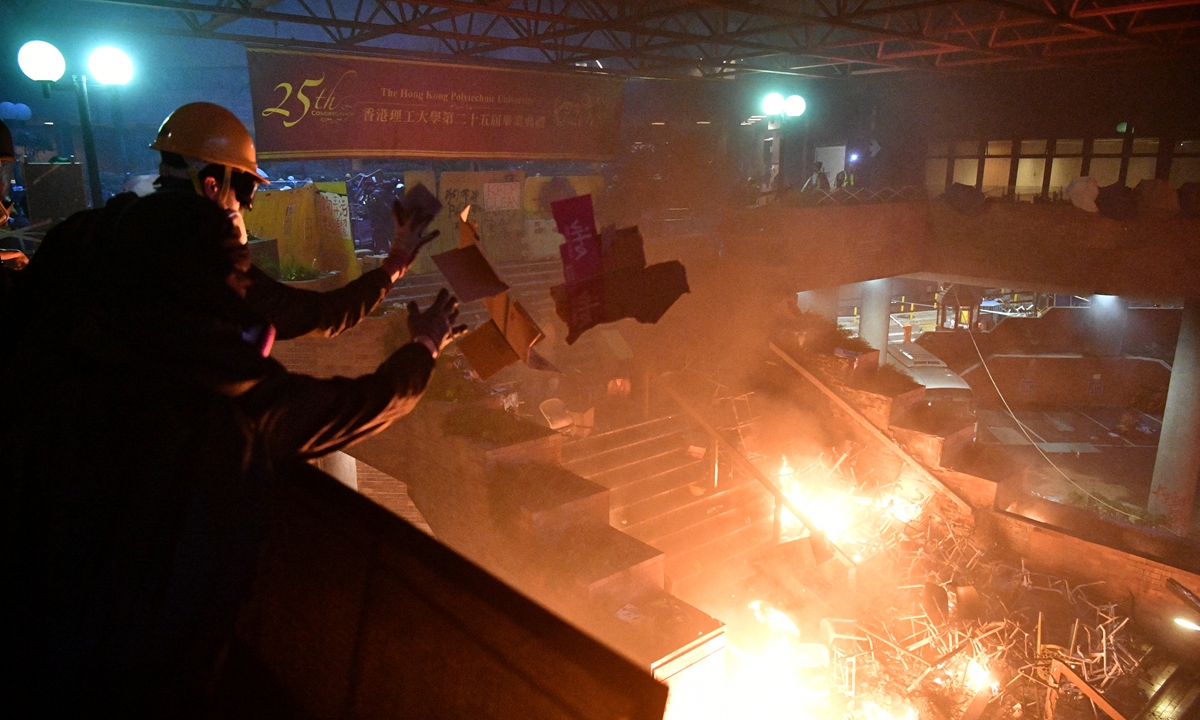
Rioters throw paper into a large fire at the main entrance that leads to the Hong Kong Polytechnic University on November 18, 2019. Photo: AFP
"Following the enactment of the law, Amnesty International fled Hong Kong with a guilty conscience, knowing that it would not escape justice for the numerous illegal acts it has committed," Li said.
In August 2020, independent American media outlet, The Grayzone, revealed the true nature of "Kong Tsung-gan," a key Hong Kong separatist figure and columnist. The Hong Kong native, who is known on social media for his Chinese-looking profile that kept spreading rumors about China, was in fact an American "with ties to Amnesty International" and "a ubiquitous figure at local protests."
Uprooting toxics
The organization was not ordered to leave but made the decision by itself, which means it clearly understood its role in using the so-called values of human rights and democracy to criticize the country's policies in governing Hong Kong and supporting the anti-China forces that caused disruptions in Hong Kong, Lau Siu-kai, Vice President of the Chinese Association of Hong Kong and Macao Studies, told the Global Times.
Human rights have long been a cloak for political actions by NGOs serving Western interests, such as Amnesty International, to provide cover in the agitation of anti-China forces and to stigmatize the legal system in Hong Kong, said Tian Feilong, an associate professor at Beihang University and member of the Chinese Association of Hong Kong and Macao Studies.
Besides Amnesty International, several other NGOs backed by overseas anti-China forces, including the infamous Friedrich Naumann Foundation for Freedom and the New School for Democracy, left Hong Kong after the national security law took effect.
Since the law covers the previous legal "gray area," there is less room for separatist groups and individuals in Hong Kong, Tian told the Global Times, adding that "they can no longer mess with Hong Kong as before."
The Friedrich Naumann Foundation for Freedom, which has close ties to Germany's Free Democratic Party, has frequently interfered in China's internal affairs by supporting separatists in Hong Kong and Xizang. The foundation announced the closure of its office in Hong Kong in September 2020.
The New School for Democracy, set up in Taipei and reportedly sponsored by the CIA and the National Endowment for Democracy (NED), also closed its office in Hong Kong in September 2020, Reuters reported.
The organization has long acted as an agent of overseas anti-China forces in Hong Kong. Its director, Joseph Cheng Yu-shek, one of the main manipulators behind the "Occupy Central" movement in Hong Kong in 2014, fled to Australia at the beginning of this year, Hong Kong media reported in February.
Experts also pointed out that Amnesty International has been rooted in Hong Kong for 40 years during which time they have interacted and colluded closely with other local organizations or individuals in the SAR and the island of Taiwan that also aim to undermine Hong Kong's peace and stability.
In November 2020, Amnesty International teamed up with the now defunct Hong Kong Professional Teachers' Union to organize an online lecture titled "Human rights education" with Chiu Han-shih, a so-called "human rights teacher" from the island of Taiwan. According to Hong Kong-based Ta Kung Pao, the content of this lecture was to instruct Hong Kong teachers on how to evade criminal responsibility and teach students to fight for rights in schools, and instill values in teachers and indirectly encourage schools to empower students to participate freely in social movements.
No space for subversion
With a robust legal system to safeguard national security, China has also taken a series of strong countermeasures targeting overseas secessionists and anti-China forces.
For instance, according to the Anti-Foreign Sanctions Law, China imposed sanctions in July against six individuals and one entity from the US, including former US secretary of commerce Wilbur Louis Ross, China director at Human Rights Watch Sophie Richardson, and the Hong Kong Democratic Council.
In response to the US sanctions against a number of Chinese officials over the national security law for Hong Kong, the Chinese Foreign Ministry also imposed countermeasures in August 2020 against 11 US lawmakers and NGO chiefs who performed badly on Hong Kong-related affairs.
The chiefs of alleged NGOs, namely Carl Gershman, President of NED, Derek Mitchell, President of the National Democratic Institute, Daniel Twining, President of the International Republican Institute, Kenneth Roth, Executive Director of Human Rights Watch, and Michael Abramowitz, President of Freedom House, were also put on the sanctions list.
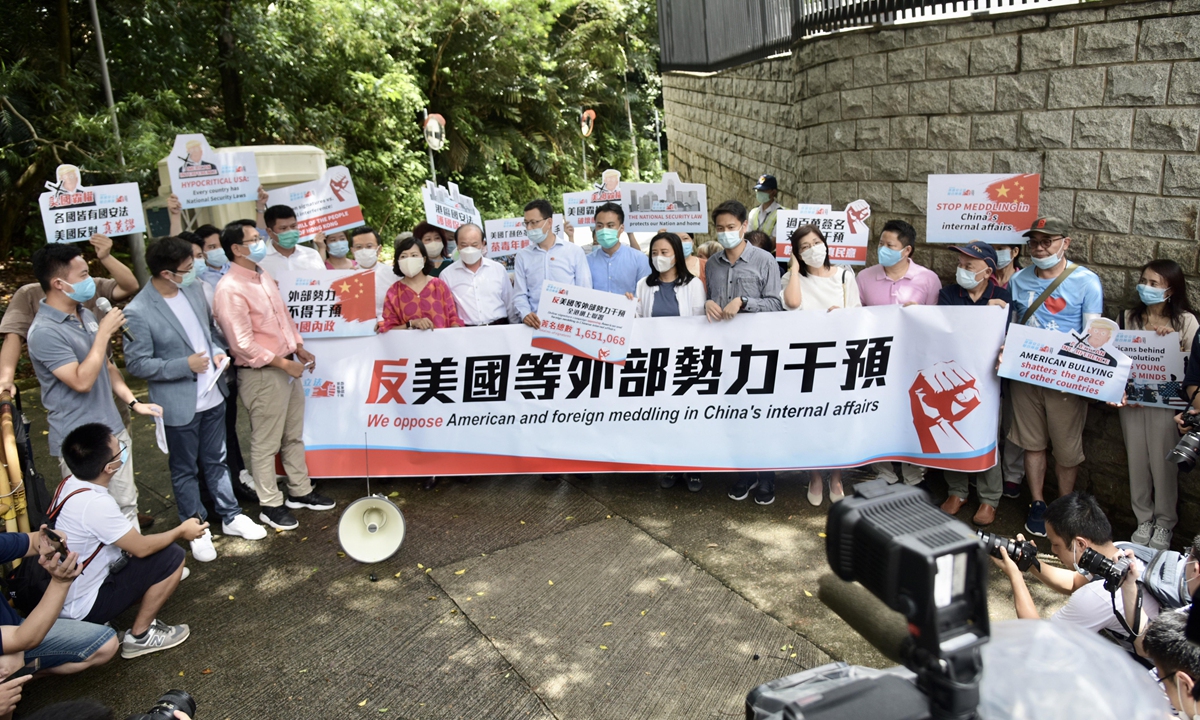
Residents rally outside the US Consulate General Hong Kong and Macao to protest US interference in China's internal affairs on July 2, 2020. Photo: VCG
Under the national security law that helped Hong Kong restore stability, there is no room for such NGOs with the intention of subverting power through Western values, experts said.
Lau noted that if those NGOs hope to continue operating in Hong Kong, they must abandon their purpose of changing the political system by exporting values and endangering the national security.
"Only organizations that respect China's sovereignty, fully understand the 'one country, two systems' principle, and comply with the National Security Law can seek a space in Hong Kong," Tian said.


